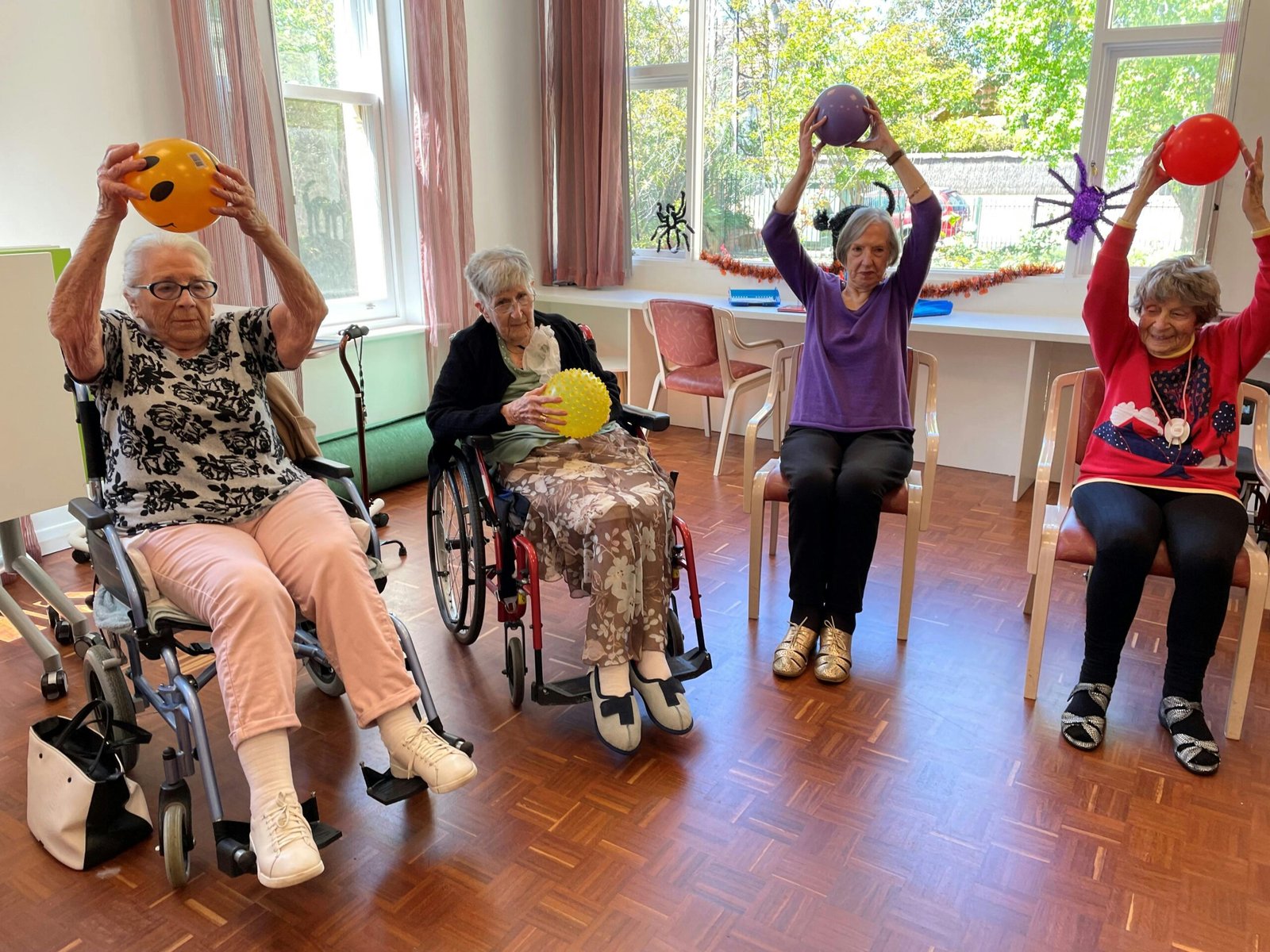For Personalized Live in Care Guidance
Compassionate Elderly Care at Home Services Never Beaten on Price with 5 Star Reviews
Growing older doesn’t mean sacrificing independence or quality of life. For many seniors across the UK, receiving care in the familiar surroundings of their own home provides comfort, dignity, and a sense of autonomy that institutional settings simply cannot match. With the right support systems in place, elderly care at home can be a fulfilling option that benefits both seniors and their families.
The Current State of Elderly Care in the UK

Recent research paints a concerning picture of elderly care access in Britain. According to Birdie’s “Village of Care” report, only 6% of elderly Britons surveyed receive state-funded or private home care services. This startling statistic highlights a significant gap in professional care provision, with an estimated 400,000 people currently on waiting lists for care services.
The consequences of this care shortage are far-reaching. Families across the UK are shouldering the majority of elderly care responsibilities, with over 60% of seniors relying primarily on family members for support. However, this arrangement is proving increasingly unsustainable, as more than half (53%) of surveyed seniors report needing more help than they currently receive.
As the UK’s population continues to age rapidly, these challenges are likely to intensify. Nearly half (44%) of people aged 70 and above require ongoing support from two or more specialist caregivers, highlighting the complex nature of elderly care needs.
Understanding Elderly Care at Home
Elderly care at home encompasses a wide range of support services designed to help older adults maintain their independence while receiving necessary assistance. According to Helping Hands, one of the UK’s leading home care providers, elderly care involves “dedicated support for an older person who wishes to continue living in their own home”.
This support can take many forms, including:
Personal Care Assistance
Personal care forms the foundation of many home care arrangements. This includes help with:
- Bathing and showering
- Dressing and grooming
- Toileting and continence management
- Mobility support and transfers
- Medication management and reminders
For many seniors, maintaining personal hygiene becomes increasingly challenging with age. Compassionate caregivers can provide dignified assistance that preserves self-esteem while ensuring proper health and hygiene.
Household Support
Maintaining a home becomes more difficult as physical abilities decline. Home care services typically include:
- Housekeeping and cleaning
- Laundry and linen changing
- Meal planning and preparation
- Grocery shopping and errands
- Pet care assistance
- Garden maintenance
These services ensure that seniors live in clean, comfortable environments with nutritious meals tailored to their dietary needs and preferences.
Companionship and Social Engagement
Loneliness and isolation represent significant health risks for elderly individuals. Quality home care includes:
- Meaningful conversation and active listening
- Accompaniment to social events and activities
- Support with hobbies and interests
- Assistance with communication technology to connect with loved ones
- Games, reading, and cognitive stimulation
Regular social interaction not only improves mental health but can also slow cognitive decline and enhance overall quality of life.
Specialized Care Services
Many seniors require more specialized support for specific health conditions:
Dementia and Alzheimer’s Care
Specialized caregivers trained in cognitive impairment support can:
- Maintain familiar routines to reduce anxiety
- Use validation techniques for emotional support
- Create safe environments that minimize confusion
- Engage in memory-stimulating activities
- Support family members with education and resources
Post-Hospital Recovery
After hospitalization, seniors may need:
- Medication management according to discharge instructions
- Wound care and monitoring
- Assistance with prescribed rehabilitation exercises
- Transportation to follow-up appointments
- Communication with healthcare providers
Palliative and End-of-Life Care
For those with life-limiting conditions, compassionate care includes:
- Pain management assistance
- Comfort measures and positioning
- Emotional support for clients and families
- Coordination with hospice services
- Respecting end-of-life wishes
The Benefits of Elderly Care at Home
Maintaining Independence and Dignity
Perhaps the most significant advantage of home care is the preservation of independence. As noted by Right at Home, “we provide homecare for elderly people, in their own homes… we recognise that daily activities may not be as easy to complete as they once were”. By receiving support with challenging tasks while continuing to manage those they can handle independently, seniors maintain a greater sense of control and self-determination.
Personalized, One-to-One Support
Unlike residential facilities where staff must divide attention among many residents, home care provides personalized, one-to-one support. Helping Hands emphasizes that “care at home gives you the opportunity to receive personal one-to-one support from your own carer, meaning you’ll always have their full attention”. This individualized approach ensures that care is tailored to specific needs, preferences, and routines.
Familiar Environment and Routines
The psychological benefits of remaining in a familiar environment cannot be overstated. Helping Hands notes that “you cannot underestimate the positive impact that living at home for your care can have on your emotional and physical wellbeing. By remaining amongst precious people, pets, and possessions, your favourite memories will always be at your fingertips”.
This sentiment is echoed in personal experiences, such as one shared on DadBlog: “My grandmother… she never let anything slow her down—not even cancer. Even in her late eighties, she’d still be found baking, rearranging cupboards ‘for fun,’ or giving us all unsolicited life advice. Keeping her at home was never just about comfort; it was about letting her live on her terms”.
Flexible Care Options
Home care can be tailored to meet varying levels of need, from occasional visits to round-the-clock support:
- Hourly Care: Scheduled visits for specific tasks or companionship
- Daily Care: Regular support with daily activities and routines
- Live-in Elderly Care: 24/7 support from a dedicated caregiver who lives in the home
- Respite Care: Temporary relief for family caregivers
This flexibility allows care arrangements to evolve as needs change, providing reassurance that support will remain appropriate and sufficient.
Family Involvement
Home care facilitates continued family involvement in a senior’s life. Helping Hands points out that “you’ll be able to choose when your family and friends visit, and your carer can assist with hosting duties – including getting your home spick and span”2. This arrangement allows families to remain active participants in their loved one’s care while receiving professional support.
Innovative Approaches to Elderly Care
The NHS Long Term Plan recognizes the importance of supporting older people to live independently at home. Key initiatives include:
- Multidisciplinary team approaches where doctors, nurses, and allied health professionals work together to provide tailored support
- Rapid community response teams to support older people with health issues before they need hospital treatment
- Enhanced support in care homes with stronger links between care homes, local general practices, and community services
- Technology integration such as wearable devices and monitors to support people with long-term health problems
- These approaches represent promising developments in elderly care, though as Age UK notes, "at present though these new approaches are only patchily available, whereas they need to be on offer to every older person, wherever they happen to live".

Choosing the Right Care Provider
When selecting a home care provider, several factors should be considered:

Quality Ratings and Accreditation
The Care Quality Commission (CQC) rates care providers across England. According to Age Space’s review of live-in care companies, providers like The Good Care Group and Trinity Homecare have achieved Outstanding ratings, placing them in the top 3% of home care providers in the UK.
Caregiver Training and Qualifications
Quality providers invest in comprehensive training for their care staff. Right at Home, for example, puts caregivers through “a thorough recruitment process with interviews, competency testing, psychometric analysis, reference and background checks” followed by “onboarding training and an orientation process, above the national legal requirement”.




Personalized Care Planning
The best providers develop individualized care plans based on thorough assessments. Hometouch, a highly-rated provider, emphasizes that their “clinical care manager works with clients and their families to implement a tailored and person-centred care plan”.
Continuity of Care
Consistent caregiver assignment is crucial for building trust and understanding. Trinity Homecare’s “unique CareMatch Program ensures your relative is partnered with a caregiver that they can live happily and harmoniously with, while providing a high level of care”.
Hear What Our Clients Says
Frequently Asked Questions
What factors influence the cost of elderly care at home?
The cost of elderly care at home varies depending on several factors, including:
Level of care needed: Basic assistance with daily activities versus specialized medical care.
Frequency and duration of visits: Occasional visits versus round-the-clock care.
Geographic location: Costs can differ based on regional living expenses.
Specific services required: Additional services like physiotherapy or dementia care may incur extra charges.
What is the typical weekly cost for live-in care from top providers?
According to Age Space’s review, weekly costs for live-in care from top providers range from approximately £1,533 to £1,779. This represents a significant investment, but various funding options may be available to assist with these expenses.
What funding options are available to help cover the costs of elderly care at home?
Several funding options may be available, including:
Local authority support: Financial assistance based on a means test.
NHS Continuing Healthcare funding: For individuals with significant health needs.
Attendance Allowance: A benefit for those over State Pension age who need help with personal care.
Personal Independence Payment (PIP): For individuals under State Pension age with long-term health conditions.
Pension Credit: An income-related benefit for people over State Pension age.
Equity release schemes: Accessing the value of your home to fund care.
Insurance policies: Certain policies may cover long-term care costs.
How is technology influencing the future of elderly care at home?
Technology integration is becoming increasingly important in elderly care. Innovations such as care technology and digital transformation are part of the solution to challenges in health and elderly care. These advancements aim to improve the quality and efficiency of care provided at home.
Choosing the right care arrangement for an elderly loved one represents one of the most significant decisions families face. By understanding the benefits, options, and considerations associated with elderly care at home, families can make informed choices that prioritize both quality of care and quality of life.
Making Informed Decisions About Elderly Care
As DadBlog poignantly observes, home care offers “not just support, but dignity and the ability to live life on your own terms for as long as possible”. With the right support systems in place, elderly individuals can continue to thrive in the comfort and familiarity of their own homes, maintaining independence, dignity, and connection to the people and places they cherish.
Whether you’re just beginning to explore care options or seeking to enhance an existing arrangement, remember that the goal remains the same: supporting your loved one to live their best possible life, surrounded by comfort, care, and compassion.

Contact Us
Phone: 0808 5012888
Email: support@tieronecare.co.uk
Head office
182-184 High Street North
East Ham
London
E6 2JA
Information
About Us
Careers
Blog
Legal
Privacy Policy
Cookie Policy
Terms & Condition




